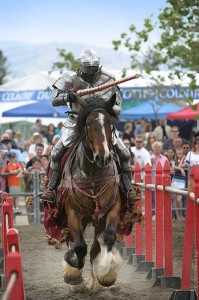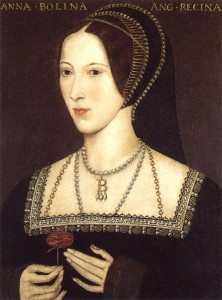 (or Henry Norris with the dead men’s shoes at the May Day Joust!)
(or Henry Norris with the dead men’s shoes at the May Day Joust!)
The May Day joust of the 1st May 1536 should have been like every other May Day joust, it should have been a day of celebration, of fun and joy, instead it was to be the first outward sign that something was wrong in Tudor Paradise.
Anne Boleyn sat watching the May Day jousting at Greenwich with her husband, King Henry VIII, blissfully unaware of the interrogation of Mark Smeaton the day before. Anne may have been pre-occupied as she was worried about a conversation she had had with Henry Norris, which could be misconstrued and used against her by her enemies, and she was probably concerned about her husband’s interest in a certain Jane Seymour, one of her ladies, but she had no clue about what was shortly to unfold. When Sir Thomas Wyatt wrote “circa Regna tonat“, “about the throne the thunder rolls”, he knew what he was talking about!
Professor Eric Ives talks of how the poem by Lancelot de Carles from the 2nd June 1536 leads us to believe that the King was in a jovial mood and that when Henry Norris’s mount started playing up the King was more than happy to offer his Groom of the Stool and good friend his own horse1.
A Change of Mood
Ives writes of how George Boleyn, Lord Rochford, “led the challengers and Henry Norris the answerers, and nothing untoward was noticed by the spectators”, but suddenly everything changed. Ives writes of how Henry VIII suddenly got up at the end of the joust and Weir writes that the King’s rather “abrupt departure was prompted by a message which was almost certainly to inform him that Smeaton had confessed to adultery with the Queen and had incriminated Rochford, Norris and Brereton, and perhaps Weston also.”2 The Spanish Chronicle has this to say:-
“The Secretary at once [after Smeaton had confessed] wrote to the King, and sent Mark’s confession to him by a nephew of his called Richard Cromwell, the letter being conceived as follows: “Your Majesty will understand that jealous of your honour, and seeing certain things passing in your palace, I determined to investigate and discover the truth. Your Majesty will recollect that Mark has hardly been in your service four months and only has £100 salary, and yet all the Court notices his splendour, and that he has spent a large sum for these jousts, all of which has aroused suspicions in the minds of certain gentleman, and I have examined Mark, who has made the confession which I enclose to your Majesty in this letter.””3
The Spanish Chronicle then has the King leaving by boat for Westminster, yet Ives quotes Constantine (George Constantine, Norris’s manservant) as saying that the King left for Whitehall on horseback with Henry Norris and spent the journey “in examination and promised him [Norris] his pardon in case he would utter the truth.”4 and de Carles, quoted in Weir, said that the King offered “to spare [Norris’s] life and goods, although he was guilty, if he would tell him the truth.”5 Sir Henry Norris proclaimed his innocence and de Carles even has Norris offering to submit to trial by combat: “Being told the accusation, [he] offered to maintain the contrary with his body in any place”6 but at dawn on Tuesday 2nd May he was taken to the Tower of London where he told his chaplain:-
“I would rather die a thousand deaths than be guilty of such a falsehood.”7
 Henry Norris, Dead Men’s Shoes, the Almoner and a Quarrel
Henry Norris, Dead Men’s Shoes, the Almoner and a Quarrel
So, what was Anne worrying about? What had she said to Henry Norris on the 29th April that had caused her to instruct him to go to her almoner on Sunday 30th and take an oath that Anne “was a good woman”8?What had caused such gossip around the court and even an argument between Anne and her husband the King?
On Saturday the 29th April, Anne Boleyn had quarrelled with Henry Norris, her husband’s Groom of the Stool, a member of the Boleyn faction and a man who was courting Anne’s cousin and lady, Madge Shelton. Anne asked him why he was taking so long to marry Madge and when he gave her a non-committal answer she rebuked him, saying, “You look for dead men’s shoes; for if ought came to the king but good you would look to have me”9, accusing him of delaying his marriage to Madge because he fancied her, to which Norris replied in horror, “he would his head were off.”10 Anne then threatened Norris, saying that she could undo him if she wanted.
Why was Norris so horrified and why did act Anne ask Norris to go to her almoner and swear an oath about her character? It was because in anger she had spoken recklessly. Not only had she said something very inappropriate for a married woman, never-mind queen, she had also broken the rules of courtly love and spoken of the King’s death. Eric Ives points out that the rules of courtly love “said that the courtier should proposition the great lady”11 but that Anne had reversed the roles in speaking to Norris in that way, she had become the “aggressor” and “at once that put Norris’s reply on a different level. Anne was attempting to force a commitment far beyond convention. Even worse, “if ought came to the King but good you would look to have me” could be interpreted as Anne having a personal interest in Norris, hence the oath offered to her almoner.”12 It was these words that would haunt Anne until her death as they could be used against her, not only to provide evidence of some kind of relationship between her and Norris, but also as proof that she was plotting the King’s death with Norris and others.
This quarrel with Norris, and the gossip it caused, may have been the reason for an argument between the King and Queen on Sunday 30th April, recorded by Alexander Ales and written as an account for Elizabeth I, Anne and Henry’s daughter, in September 1559:-
“Never shall I forget the sorrow which I felt when I saw the most serene queen, your most religious mother, carrying you, still a baby, in her arms and entreating the most serene king your father, in Greenwich Palace, from the open window of which he was looking into the courtyard, when she brought you to him. I did not perfectly understand what had been going on, but the faces and gestures of the speakers plainly showed that the king was angry, although he could conceal his anger wonderfully well. Yet from the protracted conference of the council (for whom the crowd was waiting until it was quite dark, expecting that they would return to London), it was most obvious to everyone that some deep and difficult question was being discussed.”13
Eric Ives writes of how Henry’s anger may have subsided long enough for him to continue with the May Day jousts but it was ominous that the King postponed the court’s move to Rochester. It was the confession of a lowly court musician late on Sunday 30th or early on May Day that gave Cromwell the evidence he needed to move against the Queen and her faction. As Ives says, “that fatal catalyst would be Mark Smeaton”, because his confession could turn courtly love and reckless remarks into something far more sinister.
Little did Anne know, as she watched her brother joust, that her world was falling apart around her.
You can read more about Henry Norris in the following articles:-
Notes and Sources
1 – The Life and Death of Anne Boleyn, Eric Ives, p320
2 – The Lady in the Tower: The Fall of Anne Boleyn, Alison Weir, p127
3 – The Chronicle of King Henry VIII – online version, p62 and 63
4 – The Life and Death of Anne Boleyn, Eric Ives, p320
5 – Lancelot de Carles quoted in The Lady in the Tower: The Fall of Anne Boleyn, Alison Weir, p129
6 – Ibid.
7 – Constantine quoted in Lancelot de Carles quoted in The Lady in the Tower: The Fall of Anne Boleyn, Alison Weir, p130
8 – The Life and Death of Anne Boleyn, Eric Ives, p325
9, 10, 11, 12 – The Life and Death of Anne Boleyn, Eric Ives, p335
13 – Ales quoted in The Life and Death of Anne Boleyn, Eric Ives, p325